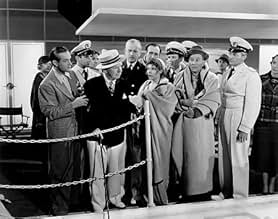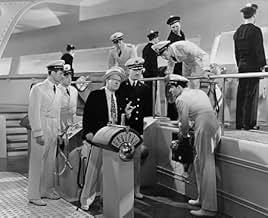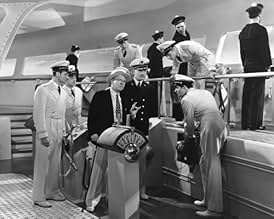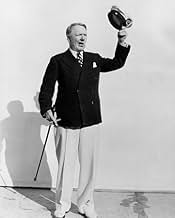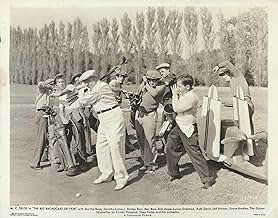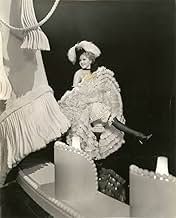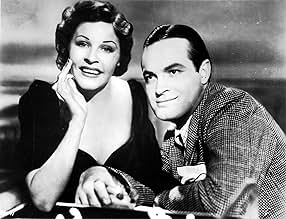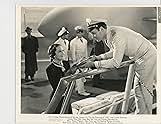IMDb RATING
6.1/10
1.1K
YOUR RATING
The Bellows family causes comic confusion on an ocean liner, with time out for radio-style musical acts.The Bellows family causes comic confusion on an ocean liner, with time out for radio-style musical acts.The Bellows family causes comic confusion on an ocean liner, with time out for radio-style musical acts.
- Won 1 Oscar
- 5 wins total
Leif Erickson
- Bob Hayes
- (as Leif Erikson)
Virginia Vale
- Joan Fielding
- (as Dorothy Howe)
Featured reviews
One must have at least a passing familiarity with the 1930s to understand and/or enjoy "The Big Broadcast of 1938". Without that, the movie is a curio piece to be remembered only as Bob Hope's first major film appearance and the one where he first sang "Thanks for the Memory" (soon to be his theme); W.C. Fields's last film for Paramount; and, perhaps if you're of a certain age, Martha Raye and Dorothy Lamour.
"The Big Broadcast of . . . " series of films were strictly pastiche: an odd mixture of familiar film faces, radio personalities, and vaudeville, burlesque and novelty acts with an extremely loose storyline stringing it all together. For 10¢ and the B-picture with an A-picture double-bill, the movie would have hit the spot for most Depression-era movie-goers.
The humour and jokes are pretty period specific, making the movies already out-of-date even ten years later. Without a map and a compass, the territory would be unfamiliar to audiences 70 years later. But that's not unique to "The Big Broadcast of . . . " series either. How well will "Canonball Run", "Airplane", "Scary Movie" and "Meet the Spartans" (all products of their time) hold up in 70 years? As others have stated, the best segment of the film is Hope and Shirley Ross singing the very tender and bittersweet, "Thanks for the Memory". Don't expect much from "The Big Broadcast of 1938", view it as the mind-candy of your great-, grand- or parents' generation.
"The Big Broadcast of . . . " series of films were strictly pastiche: an odd mixture of familiar film faces, radio personalities, and vaudeville, burlesque and novelty acts with an extremely loose storyline stringing it all together. For 10¢ and the B-picture with an A-picture double-bill, the movie would have hit the spot for most Depression-era movie-goers.
The humour and jokes are pretty period specific, making the movies already out-of-date even ten years later. Without a map and a compass, the territory would be unfamiliar to audiences 70 years later. But that's not unique to "The Big Broadcast of . . . " series either. How well will "Canonball Run", "Airplane", "Scary Movie" and "Meet the Spartans" (all products of their time) hold up in 70 years? As others have stated, the best segment of the film is Hope and Shirley Ross singing the very tender and bittersweet, "Thanks for the Memory". Don't expect much from "The Big Broadcast of 1938", view it as the mind-candy of your great-, grand- or parents' generation.
THE BIG BROADCAST OF 1938 (Paramount, 1938), directed by Mitchell Leisen, is another one of those "plotless" musicals produced by Paramount in the 1930s, this being the most memorable mainly because it puts two comic legends on screen for the first and only time: W.C. Fields (in his final film for the studio) and Bob Hope as Buzz Fielding (in his feature film debut). Out with the old, in with the new. Yet Fields and Hope share no scenes together, with Hope getting more screen time than Fields (in a dual role playing twin brothers).
The radio broadcast, hosted by Hope himself, is set on an ocean liner during a transatlantic race with another. Memorable moments include W.C. Fields golf game routine, and Shirley Ross as one of Hope's ex-wives sharing her "Thanks for the Memory" with him. "Memory" would become Hope's theme song for the duration of his career, and the Academy Award winning tune of 1938. In spite of her name placed second in the cast, Martha Raye, as Fields' accident prone daughter, arrives late into the story, making the best of her "Oh, boys!" and hi-jinx antics, as well as her song number, "Mama, Oh, Mama." On the lighter side, Dorothy Lamour (who twice sings "You Took the Words Right Out of My Heart") is somewhat wasted with her limited footage as Hope's fiancé who may or may not become Mrs. Fielding No. 4.
Aside from Lynne Overman, Ben Blue, Grace Bradley and Leif Erickson participating in the storyline, the shipboard entertainment consists of special guest appearances from Shep Fields and his Rippling Rhythm Orchestra (singing "This Little Ripple Has Rhythm"); Tito Guizar (singing "Zumi-Zumi" and "Don't Tell a Secret to a Rose") and Kirsten Flagstad (performing Richard Wagner's "Brunnilde's Battle Cry"). With the exception of "Thanks for the Memory," the score by Leo Robin and Ralph Rainger is forgettable. The big broadcast finale, "The Waltz Lives On" (sung by Hope and Ross) is passable, with Raye stepping into this number briefly with her hot jive "Truckin'". It's also interesting during that same number to see Hope dancing with Ross.
The final "Big Broadcast" musical consists of so much talent with little screen time, possibly victims of severe film editing. The theatrical trailer does include of Kirsten Flagstad performing in another opera segment not included in the final print. Although THE BIG BROADCAST OF 1938 can be a disappointment with too little Fields and too many song numbers unrelated to the plot, it somehow gets by.
The musical-comedy did have frequent revivals on the American Movie Classics cable channel from 1995 to 1998. The license to air this was later picked up by Turner Classic Movies where it premiered June 18, 2001, as part of its "Star of the Month" tribute, W.C. Fields. Prior to the start of the movie, host Robert Osborne talked a bit about the this Big Broadcast installment, and the annual musicals that preceded it, starting with the one that launched Bing Crosby in 1932, and the second in the series THE BIG BROADCAST OF 1936. Yet, there was no mention at all about the third, THE BIG BROADCAST OF 1937, as if it never existed, jumping immediately to 1938. While the three "Big Broadcast" musicals are close to being forgotten today, the 1938 edition happens to be the only one of the four available on video cassette and later on DVD, as part of the double feature package with 1938's COLLEGE SWING, also featuring Martha Raye and the legendary Bob Hope. Thanks for the Memories.(***)
The radio broadcast, hosted by Hope himself, is set on an ocean liner during a transatlantic race with another. Memorable moments include W.C. Fields golf game routine, and Shirley Ross as one of Hope's ex-wives sharing her "Thanks for the Memory" with him. "Memory" would become Hope's theme song for the duration of his career, and the Academy Award winning tune of 1938. In spite of her name placed second in the cast, Martha Raye, as Fields' accident prone daughter, arrives late into the story, making the best of her "Oh, boys!" and hi-jinx antics, as well as her song number, "Mama, Oh, Mama." On the lighter side, Dorothy Lamour (who twice sings "You Took the Words Right Out of My Heart") is somewhat wasted with her limited footage as Hope's fiancé who may or may not become Mrs. Fielding No. 4.
Aside from Lynne Overman, Ben Blue, Grace Bradley and Leif Erickson participating in the storyline, the shipboard entertainment consists of special guest appearances from Shep Fields and his Rippling Rhythm Orchestra (singing "This Little Ripple Has Rhythm"); Tito Guizar (singing "Zumi-Zumi" and "Don't Tell a Secret to a Rose") and Kirsten Flagstad (performing Richard Wagner's "Brunnilde's Battle Cry"). With the exception of "Thanks for the Memory," the score by Leo Robin and Ralph Rainger is forgettable. The big broadcast finale, "The Waltz Lives On" (sung by Hope and Ross) is passable, with Raye stepping into this number briefly with her hot jive "Truckin'". It's also interesting during that same number to see Hope dancing with Ross.
The final "Big Broadcast" musical consists of so much talent with little screen time, possibly victims of severe film editing. The theatrical trailer does include of Kirsten Flagstad performing in another opera segment not included in the final print. Although THE BIG BROADCAST OF 1938 can be a disappointment with too little Fields and too many song numbers unrelated to the plot, it somehow gets by.
The musical-comedy did have frequent revivals on the American Movie Classics cable channel from 1995 to 1998. The license to air this was later picked up by Turner Classic Movies where it premiered June 18, 2001, as part of its "Star of the Month" tribute, W.C. Fields. Prior to the start of the movie, host Robert Osborne talked a bit about the this Big Broadcast installment, and the annual musicals that preceded it, starting with the one that launched Bing Crosby in 1932, and the second in the series THE BIG BROADCAST OF 1936. Yet, there was no mention at all about the third, THE BIG BROADCAST OF 1937, as if it never existed, jumping immediately to 1938. While the three "Big Broadcast" musicals are close to being forgotten today, the 1938 edition happens to be the only one of the four available on video cassette and later on DVD, as part of the double feature package with 1938's COLLEGE SWING, also featuring Martha Raye and the legendary Bob Hope. Thanks for the Memories.(***)
7tavm
W.C. Fields and Bob Hope are probably the reasons anyone would still watch The Big Broadcast of 1938
This was my third time in watching this movie when I popped the DVD in just now. It's notable as W.C. Fields' last for Paramount, and Bob Hope's first feature after years of doing shorts. It also marked the first time Hope performed what became his theme song-"Thanks for the Memory"-which, as performed here, was originally a bittersweet ditty of a love that had its ups and downs with Shirley Ross providing a nice share of wit in duetting with Hope in singing it. Fields is funny whether playing golf, pool, or trying to run the ship though I admit I rewinded some of his scenes to try to understand what he's saying! Two future Hope co-stars, Dorothy Lamour and Martha Raye, provide some charms along the way with Ms. Lamour singing a nice romantic ballad and Ms. Raye doing some great comic banter and slapstick. There's also some amusements from Ben Blue and a forgotten lady named Patricia Wilder as a Southern belle doing deadpan shtick. Oh, and an animated sequence produced by Leon Schlesinger though since he was just a money man, it could possibly have been helmed by whoever was the "supervisor" under him at the time like Fred "Tex" Avery, Robert Clampett, or Frank Tashlin. No great shakes but The Big Broadcast of 1938 is worth a look for historical reasons and if you find the people I mentioned entertaining.
If The Big Broadcast of 1938 is remembered today it's for the fact that it introduced Bob Hope in his first feature film and at the same time gave him his theme song Thanks for the Memory. Hope was billed fifth in this production behind W.C.Fields, Martha Raye, Dorothy Lamour, and Shirley Ross.
It was in fact a Fields film, but it was also to be Fields's last film for Paramount and everyone knew it. Though there are some flashes of typical Fields humor, basically Fields staggers through the role, a dual role in fact of two brothers, owners of a transatlantic steamship line.
The very thin plot of this film is the fact that two big luxury liners are in a race from New York to Cherbourg with a lot of money in various bets on the race. In fact that's where Bob Hope's money is, tied up in wagers. If he loses, his three ex-wives are going to clobber him with alimony, the three former spouses being Shirley Ross, Dorothy Lamour, and Grace Bradley.
All three are on board one of the liners with Hope who's a broadcaster and will be broadcasting the race on a worldwide hookup.
Of course the plot is simply a convenience to allow a lot of talented people to show their stuff and they do. Besides Thanks for the Memory, Dorothy Lamour has a very nice song in You Took The Words Right Out Of My Heart which she sings to aspiring inventor Leif Erickson.
Thanks for the Memory is sung here and later recorded as a duet by Bob Hope and Shirley Ross. Ms. Ross's part in introducing what became the Oscar winning Best Song of 1938 is usually forgotten. Shirley Ross is also undeservedly forgotten herself today. She had a pleasing screen personality, a bit like Alice Faye and a good way with a lyric, just like Faye. Leo Robin and Ralph Rainger wrote Thanks for the Memory, probably the biggest hit that songwriting team ever had.
The Big Broadcast of 1938 was the last in a series of Big Broadcast films. By then I guess radio wasn't such a novelty gimmick to weave a film around. The first Big Broadcast gave Hope's lifetime rival, Bing Crosby, his first feature film starring role.
The film is part of an era of wonderful nonsense on the screen that was never concerned with any message of significance, just with providing the public with good entertainment. And with the cast of this film, it's guaranteed to be good entertainment.
It was in fact a Fields film, but it was also to be Fields's last film for Paramount and everyone knew it. Though there are some flashes of typical Fields humor, basically Fields staggers through the role, a dual role in fact of two brothers, owners of a transatlantic steamship line.
The very thin plot of this film is the fact that two big luxury liners are in a race from New York to Cherbourg with a lot of money in various bets on the race. In fact that's where Bob Hope's money is, tied up in wagers. If he loses, his three ex-wives are going to clobber him with alimony, the three former spouses being Shirley Ross, Dorothy Lamour, and Grace Bradley.
All three are on board one of the liners with Hope who's a broadcaster and will be broadcasting the race on a worldwide hookup.
Of course the plot is simply a convenience to allow a lot of talented people to show their stuff and they do. Besides Thanks for the Memory, Dorothy Lamour has a very nice song in You Took The Words Right Out Of My Heart which she sings to aspiring inventor Leif Erickson.
Thanks for the Memory is sung here and later recorded as a duet by Bob Hope and Shirley Ross. Ms. Ross's part in introducing what became the Oscar winning Best Song of 1938 is usually forgotten. Shirley Ross is also undeservedly forgotten herself today. She had a pleasing screen personality, a bit like Alice Faye and a good way with a lyric, just like Faye. Leo Robin and Ralph Rainger wrote Thanks for the Memory, probably the biggest hit that songwriting team ever had.
The Big Broadcast of 1938 was the last in a series of Big Broadcast films. By then I guess radio wasn't such a novelty gimmick to weave a film around. The first Big Broadcast gave Hope's lifetime rival, Bing Crosby, his first feature film starring role.
The film is part of an era of wonderful nonsense on the screen that was never concerned with any message of significance, just with providing the public with good entertainment. And with the cast of this film, it's guaranteed to be good entertainment.
The "plot" of this slapdash musical concerns a transatlantic ship race between two new "super-ships", the Gigantic and the Colossal. On board the former, S.B. Bellows (W.C. Fields), the brother of shipping line boss T. Frothingill Bellows (also Fields), tries to ensure that his ship wins, although he spends most of his times in drunken calamities. Also on board is entertainment host Buzz Fielding (Bob Hope), who takes time in between introducing musical acts to rekindle romance with one of his ex-wives (Shirley Ross), while his current girlfriend (Dorothy Lamour) falls for handsome ship radioman Bob (Leif Erickson). Things get even more chaotic when Bellows' daughter Martha (Martha Raye) comes aboard. Also featuring Ben Blue, Grace Bradley, Lynne Overman, Patricia Wilder, Rufe Davis, Lionel Pape, Virginia Hale, James Craig, Richard Denning, Monte Blue, Mae Busch, Leonid Kinskey, Bernard Punsly, and Russell Hicks.
Seemingly assembled from bits of different movies awkwardly stitched together, there's some funny stuff here, but no kind of pacing or interesting narrative. Fields, who was making his final Paramount film here, is funny, and his golf game and billiards game scenes are top notch. Bob Hope, making his feature debut, sings his signature song. I was pleasantly surprised to see future Road co-star Lamour already working with him. Martha Raye gets a rather impressive song and dance number that gets acrobatic and she obviously didn't use a double. The music numbers are an odd lot, too, with a couple of songs by Mexican star Tito Guizar, a performance from Norwegian opera diva Kirsten Flagstad (doing Wagner's "Brunnhilde's Battle Cry"), and Shep Fields and His Rippling Rhythm Orchestra doing "This Little Ripple Had Rhythm" which combines live action with animation to show the "origin" of the "rippling rhythm", which apparently was an ambulatory blob of swamp water that separates from a bog and walks to Fields' band and teaches them. It makes as much sense as it sounds. The movie won the Oscar for Best Song ("Thanks for the Memory").
Seemingly assembled from bits of different movies awkwardly stitched together, there's some funny stuff here, but no kind of pacing or interesting narrative. Fields, who was making his final Paramount film here, is funny, and his golf game and billiards game scenes are top notch. Bob Hope, making his feature debut, sings his signature song. I was pleasantly surprised to see future Road co-star Lamour already working with him. Martha Raye gets a rather impressive song and dance number that gets acrobatic and she obviously didn't use a double. The music numbers are an odd lot, too, with a couple of songs by Mexican star Tito Guizar, a performance from Norwegian opera diva Kirsten Flagstad (doing Wagner's "Brunnhilde's Battle Cry"), and Shep Fields and His Rippling Rhythm Orchestra doing "This Little Ripple Had Rhythm" which combines live action with animation to show the "origin" of the "rippling rhythm", which apparently was an ambulatory blob of swamp water that separates from a bog and walks to Fields' band and teaches them. It makes as much sense as it sounds. The movie won the Oscar for Best Song ("Thanks for the Memory").
Did you know
- GoofsNear the end of the movie the helmsman said that the S.S. Gigantic was diesel powered. That would mean that the liner's proper name would be MV (Motor Vessel) Gigantic as opposed to SS (Stream Ship) Gigantic.
- Quotes
First reporter: Say, do you know anything about electricity?
S.B. Bellows: My father occupied the chair of applied electricity at State Prison.
- ConnectionsFeatured in Hollywood and the Stars: The Fabulous Musicals (1963)
- SoundtracksThis Little Ripple Had Rhythm
(uncredited)
Music by Ralph Rainger
Performed by Shep Fields and His Rippling Rhythm Orchestra
- How long is The Big Broadcast of 1938?Powered by Alexa
Details
- Release date
- Country of origin
- Language
- Also known as
- Radioparaden 1938
- Filming locations
- Eastern Service Studios, Astoria, Queens, New York City, New York, USA(sequence: Kirsten Flagstad aria)
- Production company
- See more company credits at IMDbPro
- Runtime
- 1h 31m(91 min)
- Color
- Aspect ratio
- 1.37 : 1
Contribute to this page
Suggest an edit or add missing content

